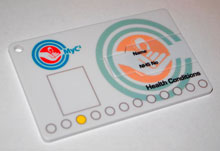Medical Smart Cards Find Their Niche
Most countries, including the U.S., lack integrated online patient-record systems. Patients visiting new doctors need to fill out paper medical-history forms. What’s more, over time, records can become spotty, incomplete, and difficult to access. This leads to both inefficiencies in the medical-record system, which cost money, and medical mistakes, which can cost lives.

Researchers and entrepreneurs hope to change that by giving each patient a smart card containing his or her complete medical history. This approach may prove difficult to implement in the U.S., owing to security fears and compatibility issues, but the technology has the potential to transform health care in countries that have unified health systems, or where there’s inadequate infrastructure for sharing records in other ways.
Researchers in the U.K. have developed the MyCare card, which is roughly the size and shape of a credit card, with a fold-out USB plug. Another project, SmartCare, first implemented in Zambia, has recently expanded to Ethiopia and South Africa and demonstrates the potential for card-based systems in parts of the world with limited infrastructure.
The MyCare card was developed at City University London; the software for it was developed at Coventry University and is open-source. The fact that anyone can download and view the code, and anyone can contribute to efforts to improve or expand on it, confers advantages.
Developers could create new software that interfaces with the data on the card—for instance, to automatically recognize incompatible prescriptions and display a warning to pharmacists. Open-source software may also provide increased security, because the software can be scrutinized openly for serious flaws. Security is a major issue surrounding medical ID cards, which store potentially sensitive private information. People fear the possibility of losing their entire medical history as easily as they might lose a wallet.
The MyCare card is also meant to interface as easily as possible across a variety of computers and operating systems. Rather than requiring installation on a computer, the card’s software runs directly from the card itself.
At the current stage of development, PINs and some degree of encryption protect the data on the card. Panicos Kyriacou, head of the project at City University London, says that more secure encryption will be implemented further along in the development process.
The encryption gives patients and doctors different levels of access. Patients can update personal information, such as next of kin or contact information, but the software allows only professionals such as doctors to edit prescriptions.
No matter how flexible the software on the card becomes, however, it will not be able to automatically work with every hospital database—health-care providers will still need to coöperate to ensure compatibility.
In the U.K., where government-paid health care is the norm, medical-record systems are already more nearly standardized than they are in the U.S., so it may be easier to establish a universal electronic record system.
The card-based system is “not a good fit” for the U.S., says John Halamka, chairman of the Healthcare Information Technology Standards Panel and CIO of both Harvard Medical School and Beth Israel Deaconess Medical Center, in Boston. “We tend to be more network- and mobile-centric,” he says, and “carrying around a card, which is common in Europe, is not our culture.”
He is more optimistic about the chief alternative to card-based electronic medical records: the cloud. The U.S. needs “Web-based personal health records in the cloud, available anywhere at any time without a card,” he says. Such a network-based alternative may require greater changes to existing health-care networks, but it is likely to give physicians even better access to important patient information.
Efforts to achieve an electronic medical-record system in the U.S., whether card- or cloud-based, are complicated by the fact that hospitals essentially compete with one another for patients. This means they have a vested interest in keeping patients—and their records—within their networks and their networks alone.
So far, the U.K. has spent £2.7 billion on a National Health Service program for IT, according to a May 18 government report. Meanwhile, in the U.S., Congress included huge cash incentives for health IT in the 2009 stimulus package, offering millions to hospitals that demonstrate “meaningful use” of electronic records.
Smart-card systems could be well suited to low-tech environments such as rural Zambia, where the SmartCare project was developed with help from former TR100 innovator Vikram Kumar. Zambia lacks the infrastructure for a network-based system, but spotty telecommunications and unreliable power supplies can’t compromise information stored on cards.
The SmartCare project was initially developed in cooperation with the Zambian government, but it has expanded its scope, with SmartCare cards now deployed in Zambia, Ethiopia, and South Africa.
As for the MyCare card, Kyriacou has high hopes for the “universal” concepts that underpin it. The card could, he says, meet the “need to have control and ownership over our medical information.”
Keep Reading
Most Popular
Large language models can do jaw-dropping things. But nobody knows exactly why.
And that's a problem. Figuring it out is one of the biggest scientific puzzles of our time and a crucial step towards controlling more powerful future models.
The problem with plug-in hybrids? Their drivers.
Plug-in hybrids are often sold as a transition to EVs, but new data from Europe shows we’re still underestimating the emissions they produce.
Google DeepMind’s new generative model makes Super Mario–like games from scratch
Genie learns how to control games by watching hours and hours of video. It could help train next-gen robots too.
How scientists traced a mysterious covid case back to six toilets
When wastewater surveillance turns into a hunt for a single infected individual, the ethics get tricky.
Stay connected
Get the latest updates from
MIT Technology Review
Discover special offers, top stories, upcoming events, and more.